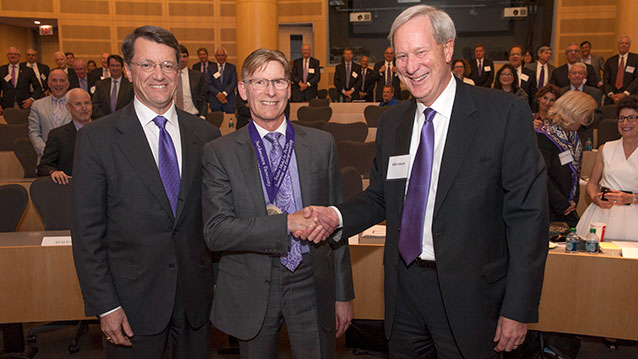EVANSTON, Ill. --- Chemistry Professor Richard B. Silverman received the Northwestern University Trustee Medal for Faculty Innovation and Entrepreneurship at the meeting of the University’s Board of Trustees Monday (June 16, 2014). Silverman is the first person to be honored with the new Trustee Medal, which recognizes the achievements of those who have made vital contributions to society through technological or social innovation.
“Rick Silverman exemplifies the characteristics that the trustees seek to encourage through the establishment of this new award,” said William A. Osborn, chair of Northwestern’s Board of Trustees. “By highlighting the importance of innovation at Northwestern and by promoting the Trustee Medal Laureates as role models, the Medal is meant to inspire faculty and students to act on their dreams with an open mind, intellectual might and ingenuity.”
The new Trustee Medal for Innovation and Entrepreneurship will also be awarded in the future to a distinguished business or industry leader for his or her achievements in the areas of science and technology.
Silverman is the John Evans Professor of Chemistry and professor of molecular biosciences. He is a bioorganic chemist with a special interest in the mechanisms of drug actions and the design of medicinal agents. He investigates the molecular mechanisms of action, rational design and syntheses of medicinal agents, and the mechanisms of enzymes. His interdisciplinary group is studying drugs that function as specific inhibitors of particular enzymes, especially those involved in neurodegenerative diseases, epilepsy and cancer.
Silverman first synthesized a small organic molecule called pregabalin in 1989, which is now marketed by Pfizer Inc. under the name Lyrica. The drug, which is used for nerve pain associated with diabetes and shingles and for epileptic seizures, became available in the United States in 2005.
Silverman, who received a Ph.D. in chemistry from Harvard University, joined Northwestern in 1976. He is a member of Northwestern's Center for Molecular Innovation and Drug Discovery, the Robert H. Lurie Comprehensive Cancer Center of Northwestern University, the Northwestern University Institute for Neuroscience and the Chemistry of Life Processes Institute.
He is author of three books, including the widely used text, “The Organic Chemistry of Drug Design and Drug Action,” now in its third edition, and more than 325 articles in organic chemistry, medicinal chemistry and enzymology. Silverman holds 57 patents, and his research has been supported by numerous grants from the National Institutes of Health.
Silverman has received numerous awards for his research and teaching, including election to the American Academy of Arts & Sciences, Excellence in Medicinal Chemistry Prize of the Israel Chemical Society, Centenary Prize of the Royal Society of Chemistry, BMS-Edward E. Smissman Award of the American Chemical Society, Fellow of the American Chemical Society, E.B. Hershberg Award for Important Discoveries in Medicinally Active Substances from the American Chemical Society, Sato Memorial International Award of the Pharmaceutical Society of Japan, and the Medicinal Chemistry Hall of Fame of the American Chemical Society."


